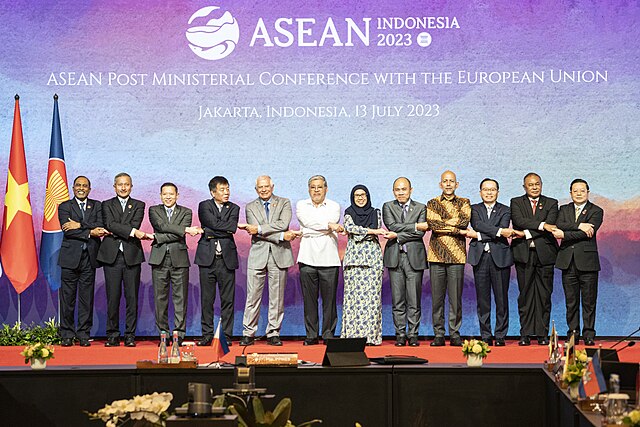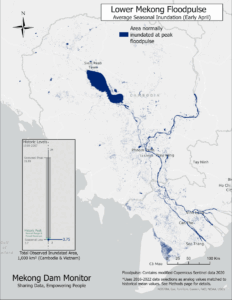Facing its third year of civil unrest since the February 2021 coup that sidelined the country’s democratic transition, Myanmar has struggled with widespread corruption, violence, and the displacement of hundreds of thousands of citizens. The immense challenges of Myanmar’s economic, political, and humanitarian crises have revealed the Achilles heel of the 10-member regional bloc of the Association of Southeast Asian Nations (ASEAN). ASEAN chairs are now tasked with juggling the annual agenda to address the Myanmar crisis on top of other rising challenges facing the region.
For the last two years, ASEAN members have been split on whether they should take a stronger stance against the violent actions of Myanmar’s military government. Association members have also struggled to create a cohesive and practical approach to the Myanmar crisis, limited by the ASEAN principles of non-intervention and consensus-building that curtail its ability to impose consequences on the military government in Myanmar. The question remains whether ASEAN has the structural capabilities to develop an effective approach to Myanmar, especially since this approach is determined by a single ASEAN country chair each year. With Myanmar itself slated to chair ASEAN in 2026, and no end in sight for its civil war, ASEAN has just three years to develop a plan of action or risk a rupture over what could transpire by then.
ASEAN admits Myanmar
ASEAN was established on August 8, 1967, with the aim of promoting regional peace and stability, as well as economic growth.1 Association of Southeast Asian Nations, “The ASEAN Declaration”, 8 August 1967, https://agreement.asean.org/media/download/20140117154159.pdf Myanmar was admitted into ASEAN in 1997, despite questions about whether the country should be accepted while under military rule. Before its acceptance, Myanmar – formerly Burma – was under an oppressive military regime known as the State Law and Order Restoration Council (SLORC). Despite Western objections from European countries and the United States, ASEAN members agreed to admit Burma into the regional bloc for its geopolitical importance and economic resources.2Robert Cribb “BURMA’S ENTRY INTO ASEAN: BACKGROUND AND IMPLICATIONS.” Asian Perspective, vol. 22, no. 3, 1998, pp. 49–62. JSTOR, http://www.jstor.org/stable/42704181. Now, some members gravely regret not requiring Myanmar to make democratic concessions before admission.3ASEAN Expert from Private Workshop In 2021, history repeated itself: an oppressive military regime took control of Myanmar, demolishing the democratic progress made over the previous decade. Today, ASEAN members must once again decide how to manage Myanmar’s membership in the association during a period of deep civil unrest for the country.
Two and a half years of division
In June 2021, only five months after the coup, the division between ASEAN members over the approach on Myanmar became apparent when the UN General Assembly adopted a resolution to condemn the coup and demand the release of political prisoners in Myanmar. Within the bloc, only six members voted in favor of the resolution (Singapore, Vietnam, Philippines, Indonesia, Malaysia, and Myanmar), while four abstained (Brunei, Cambodia, Laos, and Thailand).4Oren Samet, “There is No ASEAN Consensus on Myanmar,” The Diplomat, 22 June 2021, There is No ASEAN Consensus on Myanmar – The Diplomat. At the time, Myanmar’s UN ambassador, Kyaw Moe Tun, was a member of the country’s previously ruling party, the National League of Democracy (NLD). This dynamic signaled early on that ASEAN member consensus on the Myanmar crisis would prove a challenge, if not impossible, given ASEAN membership composition. In the association, member states can be divided into two types of governments, autocracies and democracies, which impacts their decisions on how to address Myanmar’s military coup.
Members also bring distinct individual approaches to Myanmar, making it more difficult for ASEAN to develop a harmonized approach on the crisis as a group collective. Specifically, certain ASEAN members have increased their political engagement with the Myanmar military and like-minded member states at the expense of ASEAN unity. Since December 2022, Thailand has hosted three informal talks with Myanmar military stakeholders, other autocratic ASEAN members, and international players such as China, India, Bangladesh, and Japan – a move which democratic bloc-members met with disproval.5“Thailand Hosts Myanmar Junta Figures in Talks, Key ASEAN Nations Skip,” Reuters, 23 December 2022, Thailand hosts Myanmar junta figures in talks, key ASEAN nations skip | Reuters. While these informal meetings do not require ASEAN approval, having individual member states initiate meetings with Myanmar high-level officials undermines ASEAN’s previous decision to exclude Myanmar from certain activities, such as denying Chairman of the State Administrative Council (SAC) Min Aung Hlaing a seat at the table for the ASEAN Summit in 2021.6Ibid Conversely, democratic member states have met openly with members of Myanmar’s shadow government, the Nation Unity Government (NUG) –Malaysian Foreign Minister Saifuddin Abdullah and NUG Minister of Foreign Affairs Zin Mar Aung met several times in 2022, after which he advocated for the NUG’s acceptance into the ASEAN space.7Hadi Azmi and Joseph Sipalan, “After Malaysia’s NUG Meeting, Will Asean approach towards Myanmar Shift?” SCMP, 24 May 2022, https://www.scmp.com/week-asia/politics/article/3178828/after-malaysias-nug-meeting-will-asean-approach-towards-myanmar. The lopsided attendance at these informal meetings demonstrates the internal disagreements among ASEAN members on engagement with Myanmar. Additionally, ASEAN members struggle to set aside their own country’s priorities for the sake of a unified ASEAN approach.
An example of consensus
Despite these challenges, the bloc has taken some action since the 2021 coup, but implementation remains an issue. The April 2021 Five-Point Consensus (FPC) represents successful consensus-building among all ASEAN members. The FPC calls for an immediate end to violence in Myanmar, dialogue among all parties, and the appointment of a special envoy. Still, agreement on how to fulfill the consensus and what it represents has remained out of reach. For Singapore, Indonesia, and Malaysia, the FPC is an ultimatum that the SAC must meet. For other members, it is an agreement that calls for dialogue since the FPC states that ASEAN should engage all parties –including both Myanmar’s military government and opposition groups – in the hope of bringing stakeholders to the table for negotiations. At this moment, the Five-Point Consensus has become more or less an empty statement, neither stopping the violence in Myanmar nor initiating fruitful dialogue among all parties.
The role of the chair and special envoy
A peaceful resolution through constructive ASEAN mediation in Myanmar remains highly dependent on the association chair. Since 2021, ASEAN has been chaired by the countries of Brunei (2021), Cambodia (2022), and Indonesia (2023). Each chair has taken up the task of forming an effective Myanmar strategy. However, chairs are often inheriting initiatives from their predecessors, as well as addressing new challenges, as dynamics in Myanmar are constantly shifting. ASEAN chairs also face the challenge of short-term limits, with only one year each to attempt to address the Myanmar crisis, in addition to the other challenges facing the region. There may be a better framework than the FPC, but ASEAN, including its chair, does not have the capacity to create it and cannot enforce it.8Comment from Private Workshop. But without clear and balanced leadership from the ASEAN chair to lead these initiatives, along with effective enforcement measures, consensus-building amongst members will stall again and prevent ASEAN from moving forward on the Myanmar crisis.
The chair also appoints the ASEAN Special Envoy to Myanmar, who is responsible for engaging all parties concerned. So far, these Special Envoys have been nationals of the current ASEAN chair country, more or less representing chair country goals on Myanmar. Together with the ASEAN chair, the Special Envoys to Myanmar play a critical role in future success, having been selected from the diplomatic corps of the chairing state, with the goal of enabling discussion among all Myanmar parties and uniting ASEAN members to act on the crisis. Given the time limit on the ASEAN chairmanship, members have suggested appointing a permanent ASEAN Special Envoy to Myanmar who would have greater bandwidth to assist ASEAN in developing a long-term, effective Myanmar approach. However, ASEAN has yet to address this.
In this way, the ASEAN chair position has proven vital for progress with Myanmar. An ASEAN solution based on the association’s consensus-based decision-making principle will likely see support if the ASEAN chair can delicately balance the relationships within the association. To this end, despite being unprepared for the military coup, as ASEAN chair in 2021, Brunei was able to thread the needle in balancing such relationships to broker member consensus on multiple Myanmar policies.
Success with Consensus: Brunei
The Sultan of Brunei Hassanal Bolkiah’s utilization of chair statements, which do not require bloc consensus,9Sebstian Strangio, “ASEAN Continues to Move Slowly on the Myanmar Crisis,” The Diplomat, 15 May 2023, https://thediplomat.com/2023/05/asean-continues-to-move-slowly-on-the-myanmar-crisis/. and his choice for the Special Envoy of ASEAN allowed Brunei to gain support and enact consensus-based decisions on Myanmar throughout the year as chair. Brunei took swift action to condemn the April 2021 coup and called for adherence to “principles of democracy” and “human rights” without directly mentioning the military. In this chair’s statement, Brunei upheld ASEAN’s fundamental principles without being explicitly confrontational towards the junta. Brunei also used its own Ministry of Foreign Affairs to release other statements, a move that diverted rebukes from Myanmar from falling directly on ASEAN.10Mathew L. Bukit and Hannah Elyse Sworn, “Chapter 02: Brunei Darussalam as ASEAN’s 2021 Chair,” Konrad-Adenauer-Stiftung, 2021, https://www.kas.de/documents/264850/15647932/Chapter+2.pdf/9c1ebe58-3ae2-9d4f-0343-33ec1b0cdb4a?version=1.4&t=1639738332801. The Sultan also spearheaded the passing of the Five-Point Consensus.
Additionally, Brunei’s Special Envoy, Erywan Yusof, focused on building a rapport with fellow ASEAN members, who described him as “highly consultative,”11Aaron Connolly, “Why ASEAN’s Rebuke of Myanmar’s Top General Matters,” IISS¸ 21 October 2021, Why ASEAN’s rebuke of Myanmar’s top general matters (iiss.org) after the Myanmar military banned him from meeting political prisoners like Aung San Suu Kyi. As the only monarchy in the Association, Brunei is the bridge between the two political blocs of ASEAN, democratic vs. authoritarian, and their philosophical split on how to approach Myanmar. In 2021, Yusof assisted Brunei in rallying ASEAN members to exclude Min Aung Hlaing, the leader of the junta, from the ASEAN Summit and to only accept a non-political representative. Still, civil society groups in Myanmar criticized Yusof for not considering their representation in ASEAN.12Zsombor Peter, “Special Envoy Restive Myanmar Draws Mixed Reception,” VOA, 11 August 2021, https://www.voanews.com/a/east-asia-pacific_special-envoy-restive-myanmar-draws-mixed-reception/6209416.html.
The decision to permit a non-political representative to Myanmar in the 2021 ASEAN Summit required unlocking the ASEAN consensus that is enshrined in the association and deeply embedded in practice. As ASEAN chair, Brunei built consensus around the principal that protecting the regional stability of the bloc-members was essential amid a coup that has pushed waves of displaced people to ASEAN borders and increased illicit crime. ASEAN engaged in intensive negotiations and compromises before concluding that a non-political representative was the best alternative to banning Myanmar from the 2021 ASEAN Summit. The goal of consensus also enjoys some flexibility in the ASEAN Charter – in practice, an ASEAN consensus does not only mean explicitly reaching an agreement but can also mean moving ASEAN members closer to the median position.13Aaron Connolly, “Why ASEAN’s Rebuke of Myanmar’s Top General Matters,” IISS¸ 21 October 2021, Why ASEAN’s rebuke of Myanmar’s top general matters (iiss.org) This reality makes the role of the ASEAN chair even more critical, as Brunei showed. While Brunei did not receive overt support from ASEAN’s authoritarian bloc during negotiations to accept a non-political appointee, those member-states did not stonewall the process either. When it came time to vote, all member states, except Min Aung Hlaing’s Myanmar, agreed to accept a non-political representative – a testament to Brunei’s ability to balance members’ interests.14Ibid
Additionally, Brunei’s chairmanship demonstrated that full consensus from all 10 member states was not required to admit a non-political representative for Myanmar – a move unprecedented in ASEAN’s history. Two days after member states agreed to accept the non-political representative, Myanmar’s military government released a statement conveying how Myanmar was “extremely disappointed” and “strongly objected” to the decision.15Ain Bandial, ”ASEAN Excludes Myanmar Junta Leader from Summit in Rare Move,” Reuters, 16 October 2021, https://www.reuters.com/world/asia-pacific/asean-chair-brunei-confirms-junta-leader-not-invited-summit-2021-10-16/. Based on this statement, Myanmar leadership did not agree to this course of action, yet it was implemented by ASEAN.
Since 2021, the military government has refused to send a non-political representative to the biannual summit. Nonetheless, the engagement demonstrates that ASEAN can take action towards Myanmar without the military government’s cooperation. According to Article 20 of the ASEAN Charter, in the case of a severe breach of the Charter, “when consensus cannot be achieved, the ASEAN Summit may decide how a specific decision can be made.”16Association of Southeast Asian Nations, “The ASEAN Charter” December 2007 https://asean.org/wp-content/uploads/images/archive/publications/ASEAN-Charter.pdf ASEAN can utilize this article when creating future policy on Myanmar, including potentially preventing its chairmanship in 2026.
Brunei’s strategy focused on utilizing its tools as chair to support the consensus-building within ASEAN by directly consulting with ASEAN members on the association’s approach to addressing the Myanmar crisis. Of the three chairs since 2021, Brunei has enacted a more consensus-based approach during its term than what followed during Cambodia and now Indonesia’s terms.
The “chairman of consultations” and “quiet diplomacy”
Cambodia and Indonesia have focused more on engagement with stakeholders in Myanmar than the bloc members. As ASEAN chair in 2022, Cambodia was keener than Brunei on engaging the military government in the hope of building a mutual trust with ASEAN – a move it viewed as vital to implement its plan of action, which focused on humanitarian aid. Cambodia proposed the “Friends of Myanmar” group, initially suggested by Brunei, which holds no political agenda but provided necessities to people on the ground. Cambodia believed it had to engage the military government if any progress was going to be made on this effort. Thus, Cambodian Prime Minister Hun Sen visited Myanmar shortly after beginning his stint as chair of ASEAN in January 2022 –the first visit by a head of government since the 2021 coup. Sen returned in March and June with the new Special Envoy.17“Cambodia’s Hun Sen Gives Up on Myanmar,” Radia Free Asia, 16 February 2022, https://www.rfa.org/english/news/myanmar/towel-02162022174658.html. Using humanitarian aid as its primary tactic, Cambodia took on a facilitator role rather than an enforcer role, a decision which it thought could benefit the next chair of ASEAN.
In a private roundtable, an ASEAN expert called Cambodia the “chairman of consultations.” Prime Minister Hun Sen believed he could convince self-proclaimed Myanmar Prime Minister Min Aung Hlaing to implement the FPC using face-to-face engagements that would build trust between the two authoritarian leaders. However, after multiple meetings that yielded little results, Hun Sen came to realize that the military government was disingenuous about following the FPC. Simultaneously, ASEAN members lost trust in Hun Sen, as they viewed his approach as legitimizing the military’s authority. In the end, no consensus-based framework emerged during Cambodia’s tenure to address the situation in Myanmar.
Under Indonesia, the incumbent chair, President Joko Widodo is engaging in what Indonesia calls “quiet diplomacy” meetings with Burmese stakeholders through backchannels. One of Indonesia’s top priorities is to help ASEAN engage all parties involved in the Myanmar crisis. To this end, Indonesia has established a special envoy office, led by two Indonesian diplomats—the Foreign Minister, Retno Marsudi, and Indonesia’s former ambassador to Singapore, Ngurah Swajaya, whose primary purpose is to engage all Myanmar stakeholders. According to Marsudi, Indonesia has held over 60 meetings in 2023 with the junta, the National Unity Government, and Ethnic Armed Organizations. However, one ASEAN expert critiqued Indonesia’s approach as “coiled diplomacy,” for its lack of transparency, as the members of ASEAN remain uncertain about the progress and the goals of Indonesia’s approach.18Comment from Private Round Table. The perception is that Indonesia is working closer with Myanmar stakeholders than ASEAN member states. Since the FPC remains the fallback policy for Myanmar, as ASEAN chairs, Cambodia and now Indonesia have struggled to entice ASEAN members to envision an effective and cohesive framework for Myanmar.
Conclusion
In recent years, ASEAN has stumbled in implementing an effective policy to address the significant political, economic, and humanitarian crises that Myanmar faces. Despite these challenges, finding effective solutions remains all the more urgent as Myanmar is slated to chair ASEAN in 2026. Thus, ASEAN should utilize the loophole identified in the ASEAN Charter Article 20 that permits members to take action, without consensus, when the Charter is violated. Additionally, as ASEAN members have critiqued, one year as chair is not enough time to address the Myanmar crisis; therefore, ASEAN should consider appointing a permanent Special Envoy to Myanmar, and soon. If Myanmar chairs as scheduled, its current leadership will determine the ASEAN initiatives to support its own country. Additionally, depending on the outcomes of the next Myanmar elections, allowing Myanmar to chair ASEAN could lead to regional recognition for the SAC and its leadership. If no action is taken by ASEAN and its chairs between now and 2026, ASEAN risks losing its credibility as a constructive group that can provide solutions amid a regional crisis.
Notes
- 1Association of Southeast Asian Nations, “The ASEAN Declaration”, 8 August 1967, https://agreement.asean.org/media/download/20140117154159.pdf
- 2Robert Cribb “BURMA’S ENTRY INTO ASEAN: BACKGROUND AND IMPLICATIONS.” Asian Perspective, vol. 22, no. 3, 1998, pp. 49–62. JSTOR, http://www.jstor.org/stable/42704181.
- 3ASEAN Expert from Private Workshop
- 4Oren Samet, “There is No ASEAN Consensus on Myanmar,” The Diplomat, 22 June 2021, There is No ASEAN Consensus on Myanmar – The Diplomat.
- 5“Thailand Hosts Myanmar Junta Figures in Talks, Key ASEAN Nations Skip,” Reuters, 23 December 2022, Thailand hosts Myanmar junta figures in talks, key ASEAN nations skip | Reuters.
- 6Ibid
- 7Hadi Azmi and Joseph Sipalan, “After Malaysia’s NUG Meeting, Will Asean approach towards Myanmar Shift?” SCMP, 24 May 2022, https://www.scmp.com/week-asia/politics/article/3178828/after-malaysias-nug-meeting-will-asean-approach-towards-myanmar.
- 8Comment from Private Workshop.
- 9Sebstian Strangio, “ASEAN Continues to Move Slowly on the Myanmar Crisis,” The Diplomat, 15 May 2023, https://thediplomat.com/2023/05/asean-continues-to-move-slowly-on-the-myanmar-crisis/.
- 10Mathew L. Bukit and Hannah Elyse Sworn, “Chapter 02: Brunei Darussalam as ASEAN’s 2021 Chair,” Konrad-Adenauer-Stiftung, 2021, https://www.kas.de/documents/264850/15647932/Chapter+2.pdf/9c1ebe58-3ae2-9d4f-0343-33ec1b0cdb4a?version=1.4&t=1639738332801.
- 11Aaron Connolly, “Why ASEAN’s Rebuke of Myanmar’s Top General Matters,” IISS¸ 21 October 2021, Why ASEAN’s rebuke of Myanmar’s top general matters (iiss.org)
- 12Zsombor Peter, “Special Envoy Restive Myanmar Draws Mixed Reception,” VOA, 11 August 2021, https://www.voanews.com/a/east-asia-pacific_special-envoy-restive-myanmar-draws-mixed-reception/6209416.html.
- 13Aaron Connolly, “Why ASEAN’s Rebuke of Myanmar’s Top General Matters,” IISS¸ 21 October 2021, Why ASEAN’s rebuke of Myanmar’s top general matters (iiss.org)
- 14Ibid
- 15Ain Bandial, ”ASEAN Excludes Myanmar Junta Leader from Summit in Rare Move,” Reuters, 16 October 2021, https://www.reuters.com/world/asia-pacific/asean-chair-brunei-confirms-junta-leader-not-invited-summit-2021-10-16/.
- 16Association of Southeast Asian Nations, “The ASEAN Charter” December 2007 https://asean.org/wp-content/uploads/images/archive/publications/ASEAN-Charter.pdf
- 17“Cambodia’s Hun Sen Gives Up on Myanmar,” Radia Free Asia, 16 February 2022, https://www.rfa.org/english/news/myanmar/towel-02162022174658.html.
- 18Comment from Private Round Table.




